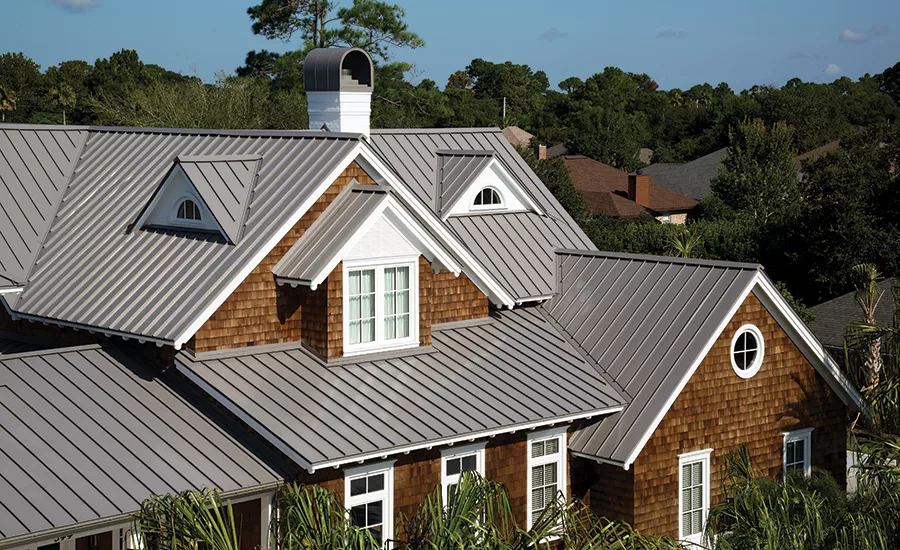6-Step Guide to Transforming Your Business with Metal Roofing

Have you ever thought about adding metal roofing to your service offering? These tips can put you well on your way to transforming your business.
Now a $3.3 billion industry in North America, metal roofing continues to grab market share from a longtime construction staple — asphalt shingles. Already a trusted go-to in commercial construction, with a recurring role in warehouses and other utility buildings, today metal roofing is also one of the fastest-growing trends in home remodeling.
It’s a golden opportunity for roofing contractors to expand their product offerings and elevate their profitability. When you incorporate metal roofing into your business, you differentiate yourself from competitors who only offer asphalt shingle roofs. You neutralize some seasonal and weather factors to keep your crews working all year long. And, you give homeowners a sense of pride in their roof and a feeling of confidence that they will never have to replace it.
Of course, metal roofing isn’t for every contractor. As Theodore Roosevelt said, nothing worth having comes easy — and building your metal roofing business involves an initial investment of time and money, plus a higher level of craftsmanship and attention to detail as you begin offering metal roofs to your customers. But if you’re committed to offering a beautiful, high-quality product built to last for generations, metal roofing has the power to completely transform your business.
Ready to get started? Follow these steps to build a thriving metal roofing business.
1. First and foremost, get educated.
Compared to shingle roofs, metal roofs require a longer labor learning curve. Luckily, you can find tremendous resources online from manufacturers, distributors and industry associations. “We definitely don’t have enough metal roofing contractors to support current demand,” said Ken Gieseke, vice president of marketing for industry manufacturing leader McElroy Metal. “We have a real interest in getting contractors and customers engaged, because the market is growing so much. Supporting contractor education creates great benefits up and down the supply chain.”
The metal roofing industry also gives its contractors a strong support network to lean on for advice, resources and ongoing training. The Metal Roofing Alliance (MRA), for example, gives its members access to MRA University, a professional training center with online tutorials, detailed installation guides and other tools.
Beyond these resources, you can also tap into instructional videos on YouTube or join one of many metal roofing-specific social media groups to connect with your peers.
However you learn, Gieseke urges contractors not to start cold. “Don’t bid a metal roof and learn the craft as you go,” he said. “Homeowners, in particular, are pretty critical about the quality of the work. Don’t wing it. And remember, you won’t be as fast on the first job as you are on the sixth or seventh job. Do all of the steps your manufacturer or supplier recommends.
“Word gets out quickly in this business,” he said. “You never want callbacks — they’re expensive for you and frustrating for the customer. But if you do a good job, word of mouth can become one of your main marketing tools.”
2. Take time building your crew.
Metal roofing requires a special skillset. “You can’t just go and grab some guys,” said Gieseke. “It takes real knowledge of things like making angle cuts and folding trim over correctly, so it’s aesthetically pleasing. Metal roofing is largely about curb appeal, and that takes craftsmanship.”
3. Know your local building codes.
These vary by jurisdiction or municipality, especially if you work in a coastal area. For example, some code bodies allow roofing contractors to install metal roofing over existing asphalt shingles, while others do not permit this practice.
4. Ask your vendor partners for help pricing jobs.
Particularly if you run a small business, incorrectly estimating the cost of a metal roofing job can really hurt your bottom line. Your distributor or manufacturer can eliminate this issue by guiding you through the process — and they’re probably glad to help. After all, what’s good for your business is also good for their business.
5. Know your metal roofing products.
Metal roofing is positioned as a premium product, with benefits like increased curb appeal, low to no maintenance and unbeatable durability. But those benefits are negated when contractors settle for installing a low-quality roofing product. “If you don’t ask the right questions, you run the risk of buying what essentially amounts to painted metal,” said Gieseke. “Make sure you only install metal roofing with high-quality substrates and coatings. For example, McElroy Metal sells metal roofing products with Fluropon®, which is the best coil coating product for residential roofing.
“Anyone can give a homeowner a roof that looks great on Day One, when you can’t tell the difference between great or inferior substrates or coatings. But even if that roof takes 20 years to chalk, fade or rust, it isn’t living up to our industry standard. As the contractor, you have to know the substrate and coatings in the metal roofing panels you’re installing.”
6. Promote your new offering.
Ready to hit the market with metal roofing? Good news: today, you have access to channels that weren’t available 20, 10 or even five years ago. Update your website and social media channels — or start telling your story if you don’t already have a presence on these platforms. Invest in yard signs and display them at jobs (with your customers’ permission, of course). Attend local home shows and national industry shows like the International Roofing Expo (IRE). Above all, take pride in your work — if you do, chances are good that customers will start coming to you.
Looking for a reprint of this article?
From high-res PDFs to custom plaques, order your copy today!


